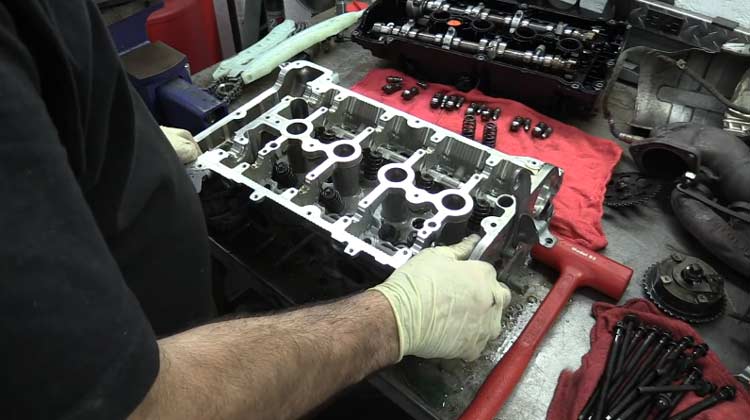If you’re experiencing any of the symptoms of a bent engine valve, it’s important to take action and get the problem fixed. A bent engine valve can cause all sorts of issues with your vehicle, including decreased performance, poor gas mileage, and even engine failure. In this blog post, I will discuss the Symptoms of a Bent Engine Valve and what to do if you think your engine valve is bent and how to get it fixed.
Engine Valve:
An engine valve is a crucial part of your vehicle’s engine. The engine valve opens and closes to allow air and fuel into the combustion chamber. When the engine valve is bent, it can cause all sorts of problems.
Symptoms of a Bent Engine Valve: Detailed Discussion
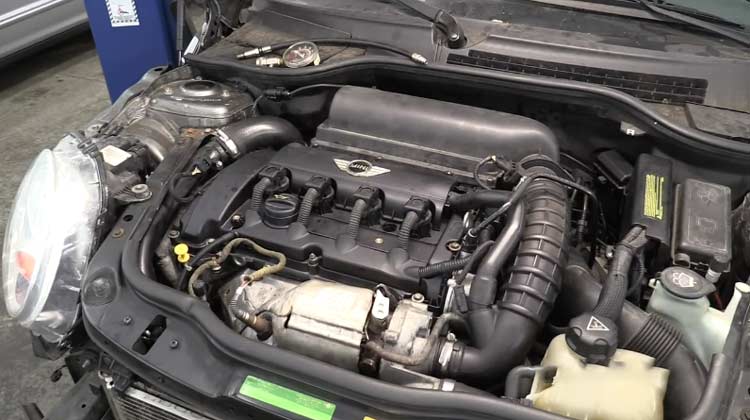
A bent engine valve will typically result in misfiring cylinders as well as a check engine light appearing on your dashboard. You may also experience other problems with your engine’s performance. Another telltale sign is low compression when you conduct a compression test. The most common symptoms of a bent engine valve include:
- Check Engine Light On
- Poor Compression
- Car Backfires
- Engine Vibration
- Power Outage
- Oil Consumption Increases
Check Engine Light On:
Most newer car models have a feature that monitors all the sensors in the engine to make sure it’s running correctly. If something is amiss with any of the sensors, it’ll light up the check engine light on your dashboard.
If any of your engine valves are bent, it will cause the check engine light to turn on. You can use an OBD2 scanner to read the trouble codes and look for air-fuel mixture-related issues.
Because the engine valves are not electronic, trouble codes will only go so far as to suggest misfires or an incorrect air-fuel mixture it will not say that an engine valve is bent.
Poor Compression:
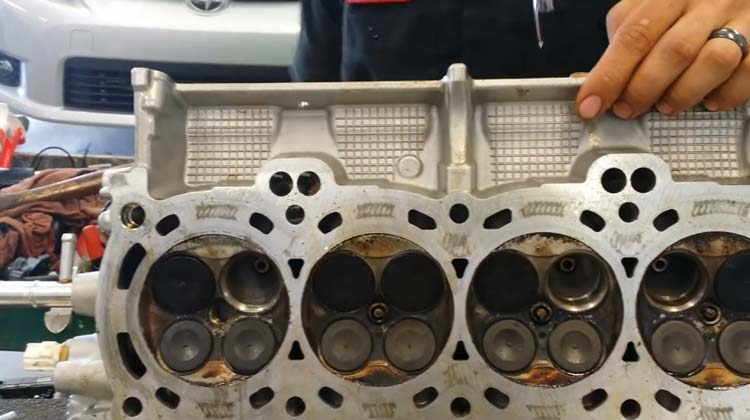
While the engine is running, compression accumulates inside the cylinder. Unbent valves usually cause an imbalance of compression. If this pressure lowering becomes imbalanced, it affects combustion and prevents fuel from igniting correctly.
A bent engine valve prevents the cylinder head from sealing correctly, causing low compression. When air or exhaust leaks out, it disrupts the compression and causes a loss of power and other issues. If you see a lower than usual reading while doing a compression test, it might be time to check your engine valves for leaks.
Car Backfires:
If an exhaust valve is bent, it prevents the fumes from leaving the cylinder at the correct time. If the valves don’t open and close precisely, it throws off the pressure in the engine.
A bent exhaust valve can wind up in the wrong spot. Additionally, it might not seal off correctly when shut. This issue causes an exhaust leak which then impacts how the fuel is burned up.
When the ECU recognizes an issue, it might overcompensate by changing how much fuel is delivered to the cylinder. When the cylinder runs rich, unburnt fuel leaks into the exhaust causing a backfire or popping sound.
Engine Vibration:
If the engine valves are not opening and closing at the precise moment, it can cause a vibration. The imbalance creates a knock that you’ll feel throughout the car. In some cases, this knocking noise is barely noticeable. However, in other instances, it can be quite loud and very annoying.
When a valve is damaged, for example by a broken timing belt, it can cause the engine to run poorly and misfire. You might especially notice this when idling or driving slowly. If the valve is only mildly damaged, you might be able to continue driving for a short while. However, if it’s severely damaged, it could cause the engine to stop working entirely.
Power Outage:
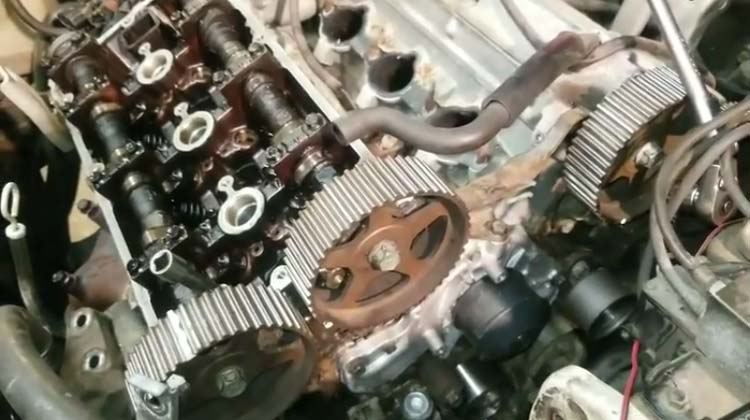
A bent engine valve will usually cause a decrease in power. More often than not, this reduction of pressure is due to the faulty valve which prevents it from closing or sitting correctly. Consequently, the combustion mixture becomes unbalanced.
Additionally, the power issues can come from the engine running too rich and trying to compensate for the problems caused by the bent valve. Either way, it must be repaired as continuing to run it will only make matters worse.
Oil Consumption Increases:
The engine valves need oil to function properly. The valve seal helps by delivering oil to the stem of the valve as it moves. However, the oil is prevented from going into with the help of the cylinder
If the valve bends, it can cause a worn or damaged seal. These broken seals allow oil to seep into the combustion chamber, which causes an excessive amount of oil to burn. This defect can also affect how the engine runs and damage the catalytic converter if it isn’t fixed quickly.
Bent engine valves can cause blue smoke from your exhaust pipe. This happens when the valve seal leaks, allowing oil to enter the combustion chamber.
Testing a Bent Engine Valves:
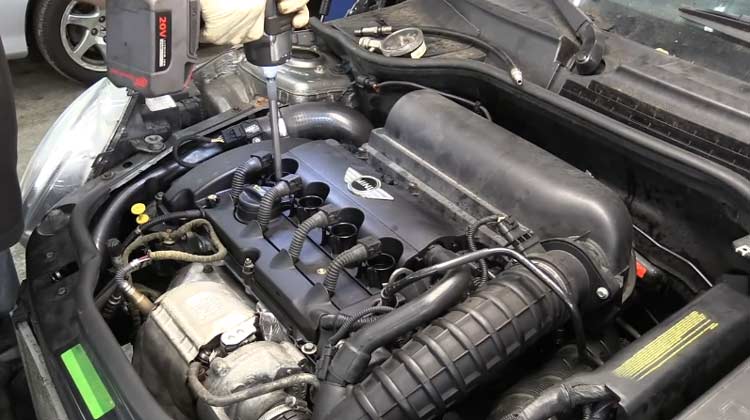
The ideal way to test for a bent engine valve is by removing the cylinder head and inspecting the valve physically. However, as this option is quite tedious, many people opt for compression tests or leak-down tests instead. A compression test measures the amount of compression each cylinder produces. It’s an easy way to see how well your engine is working.
The leak-down test is the next step after finding that one cylinder is low. This test reveals when air is leaking out of the engine by hooking up to the spark plug hole. The crankshaft gets turned until the cylinder is at the compression stroke. This is when you’ll hear a crunching sound as the air rushes out of the engine.
If air is coming from the intake, then there is a bent intake valve. If the air is coming from the exhaust, then there might be a bent exhaust valve. However, keep in mind that these issues could also arise from carbon buildup on valves which weakens the seal. If you are unsure of what exactly the problem may be, it’s best to consult with a qualified mechanic for further diagnostics.
Reason for an Engine Valve to Bend:
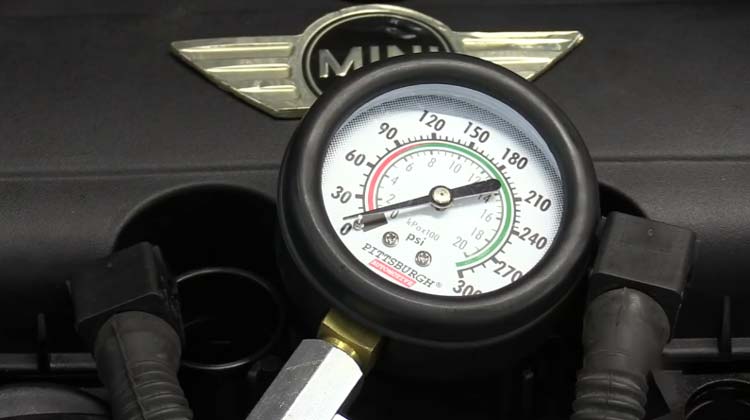
There are several reasons why an engine valve might bend.
- The most common one is due to the timing belt snapping and causing the valves to hit the pistons. This usually happens in older vehicles that have a lot of miles on them.
- Another reason for a bent engine valve is due to using the wrong type of fuel. For example, if you accidentally put diesel in a gasoline engine, it can cause the valves to bend. This is because diesel is much thicker than gasoline and can cause the valves to get stuck open.
- Lastly, improper maintenance can lead to a bent engine valve. For instance, if you don’t change your oil regularly, it can cause the engine to overheat. When this happens, the valves can warp and bend from the excessive heat.
If you think you may have a bent engine valve, it’s important to get it fixed as soon as possible. Continuing to drive with a damaged valve can cause even more damage to your engine and will eventually lead to an expensive repair bill. Be sure to consult with a qualified mechanic to get an accurate diagnosis and to determine the best course of action.
Replacement Cost of a Bent Engine Valve:
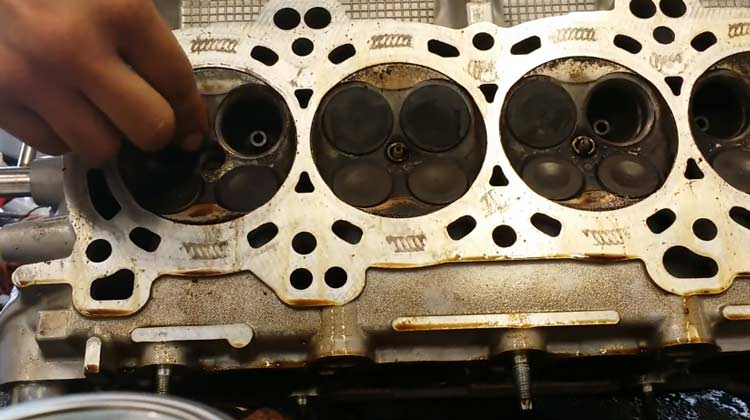
If you need to replace a bent engine valve, the cost will depend on several factors. This includes the make and model of your vehicle, the severity of the damage, and whether you need to replace one or more valves.
On average, you can expect to pay between $500 and $2000 to replace a bent engine valve. However, if the damage is severe, you may need to replace the entire engine, which can cost upwards of $5000. The labor cost for this repair will also be higher since it’s a more complicated process.
If you’re looking to avoid an expensive repair bill, be sure to stay on top of your vehicle’s maintenance. This includes regularly changing your oil, checking your timing belt, and using the correct type of fuel for your engine. By doing so, you can help prevent damage to your engine and avoid costly repairs down the road.
Bent engine valves are a serious issue that can cause extensive damage to your engine if left unchecked. Be sure to get it fixed as soon as possible to avoid any further issues.
FAQs:
Q: Can I drive with a bent engine valve?
A: No, you should not drive with a bent engine valve. Continuing to drive with a damaged valve can cause even more damage to your engine and will eventually lead to an expensive repair bill. Be sure to consult with a qualified mechanic to get an accurate diagnosis and to determine the best course of action.
Q: How can I prevent a bent engine valve?
A: The best way to prevent a bent engine valve is to stay on top of your vehicle’s maintenance. This includes regularly changing your oil, checking your timing belt, and using the correct type of fuel for your engine. By doing so, you can help prevent damage to your engine and avoid costly repairs down the road.
Q: What should I do if I think I have a bent engine valve?
A: If you think you may have a bent engine valve, it’s important to get it fixed as soon as possible. Continuing to drive with a damaged valve can cause even more damage to your engine and will eventually lead to an expensive repair bill. Be sure to consult with a qualified mechanic to get an accurate diagnosis and to determine the best course of action.
Q: What are the consequences of driving with a bent engine valve?
A: Driving with a bent engine valve can cause extensive damage to your engine. It’s important to get it fixed as soon as possible to avoid any further issues. Continuing to drive with a damaged valve can also void your warranty and may make it difficult to sell your vehicle in the future. Make sure you get a professional opinion from a qualified mechanic to know what the problem is and how to fix it.
Q: How long does it take to fix a bent engine valve?
A: The time it takes to fix a bent engine valve will depend on the severity of the damage. If the damage is minor, it may only take a few hours to repair. However, if the damage is severe, you may need to replace the entire engine, which can take several days.
Conclusion:
If you think you may have a bent engine valve, it’s important to get it fixed as soon as possible. Continuing to drive with a damaged valve can cause even more damage to your engine and will eventually lead to an expensive repair bill. Be sure to consult with a qualified mechanic to get an accurate diagnosis and to determine the best course of action.
Stay on top of your vehicle’s maintenance to help prevent a bent engine valve. This includes regularly changing your oil, checking your timing belt, and using the correct type of fuel for your engine.
I hope my detailed discussion helped understand the symptoms of a bent engine valve and what you can do about it. If you have any further questions, please feel free to reach out to me.
